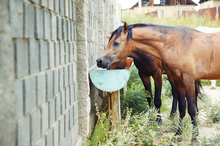According to the Unwanted Horse Coalition, would-be owners of horses should stop and think through the responsibilities of horse ownership before purchasing or taking in a horse. Doing so will save untold misery, not only for the horse, but also for those who care about horses.

Questions for would-be horse owners
By educating existing and potential owners about the long-term responsibilities of owning and caring for horses, the Unwanted Horse Coalition hopes to help horses before they become unwanted.
By educating existing and potential owners, breeders, sellers and horse organizations about the long-term responsibilities of owning and caring for horses, and focusing on opportunities available for these horses, such as retirement, retraining, new careers or uses, donation and euthanasia, the coalition hopes to help horses before they become unwanted. The UHC hopes to utilize industry resources to put owners of these horses in touch with individuals and facilities that will welcome them.
The coalition hopes teaching people to own responsibly will help lower the number of unwanted horses.
Questions to Consider Before You Buy a Horse
Can I afford to own a horse?
The American Association of Equine Practitioners estimates that the minimum yearly cost to care for a horse, not including veterinary and farrier expenses, is $1,825. Add in veterinary and farrier costs, as well as boarding expenses in some cases, and the yearly cost for keeping one horse can reach $5,000.
If you aren’t sure if you can afford a horse or if you are ready for one, leasing and/or lessons are good options. Leasing a horse enables you to experience what it will be like to own a horse without actually owning one. Many leasing options exist. Taking lessons enables you to ride horses and be around them without the extra cost and responsibility of owning one.
What will I do if my horse gets sick?
Illness is more common with horses than most people realize. Despite their size and substance, many factors can affect a horse and cause mild to very serious conditions, from a minor cold to acute colic. Few horse owners are prepared to handle a sick horse on their own, and the best course of action is often to contact a veterinarian. Some companies do offer heath insurance for horses.
How long will I own my horse?
Many horses live for 20 years and some can live for more than 30 years. If you cannot make at least a 20-year commitment to a horse, you should have a plan to provide for your horse or investigate ways to sell your horse when you can no longer take care of it.
Is my child going to leave home soon?
If you are considering buying a horse for your child, you must consider what will happen to the horse when your child goes off to college or moves out of the house. Will the horse be left at home? If so, will there be someone to take care of it? If your child is close to an age that he or she may leave home soon or his or her interests might change, leasing is a good option.
Am I planning to relocate?
If so, what will happen to the horse. Many times when people relocate, they discover that keeping a horse is impossible and they need to find a new home for the horse. Under current circumstances that is seldom possible.
